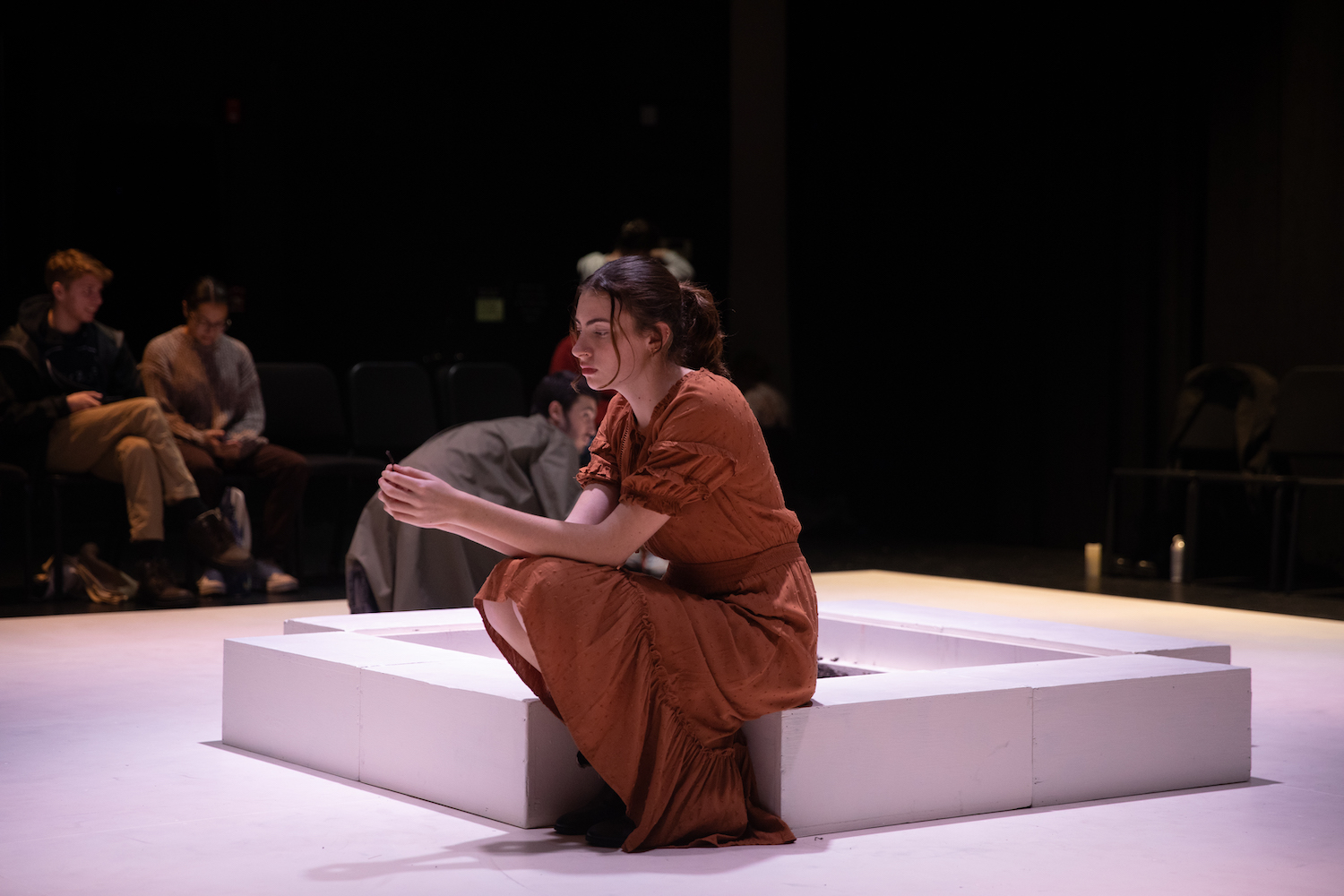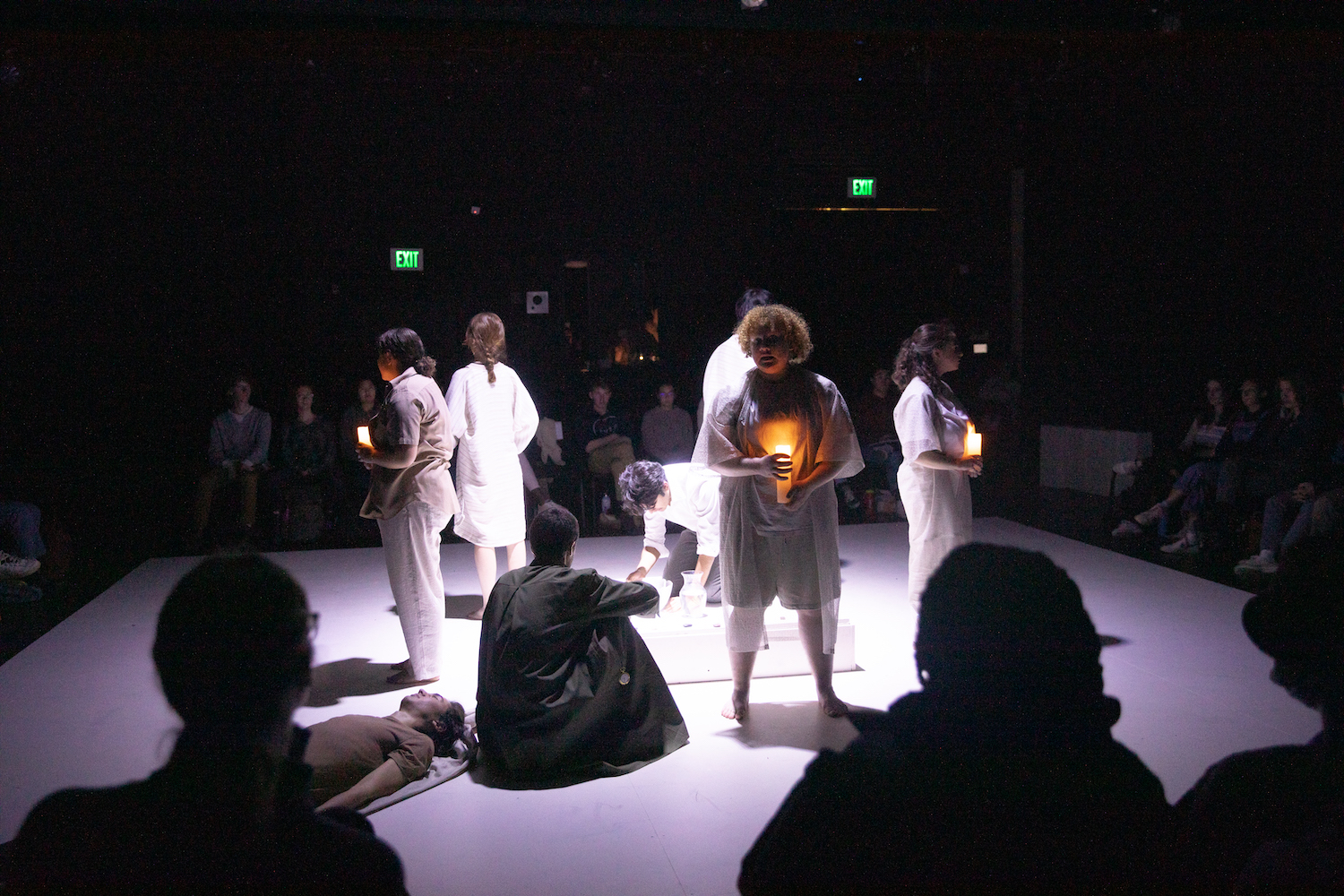
“Antigonick” is an example of my favorite kind of theater: a show that speaks to itself and to its audience at the same time. The show is an adaptation of the ancient Greek tragedy “Antigone,” reimagined by Anne Carson, and it ran from Dec. 7, 2022 to Dec. 9, 2022 in the Theater Studios. “Antigonick” explores questions pertinent to the modern day through a subversive retelling of a young girl’s tragic story. It finds merit in asking tough questions. What is the meaning of tradition, both in life and in death? What does it mean to die? Who would you die for?
A senior thesis directed by Sarah Shapiro ’23, “Antigonick” explores ritual through its highly choreographed simplicity. Staged in the black box theater in the Center for the Arts, the performance uses basic materials to tell the story of Antigone (played by CJ Joseph ’25), a girl who dies for a cause she believes in, going against tradition and the will of her father King Kreon (Nikhil Sekaran ’25).
Antigone’s brothers fight and kill each other prior to the beginning of the show. According to Greek law, only one can be buried. Antigone defies her father and buries both brothers. After being caught by a member of the chorus, Antigone is sentenced to be buried alive. Her fiancé Haimon (Leo Kaplan ’26) confronts King Kreon before killing himself, and Antigone’s mother eventually kills herself as well. Antigone’s father is left without a family, alone with the sins he has committed.
I love the essential nature of Greek tragedies. There is something powerful about a story where you know what happens, but you’re still attracted to the narrative it weaves. The cast wants you to know how it ends; they introduce the plot as they lead you down the stairs to the black box and point out photos of previous iterations of the show, dating from 1942 to today, at different colleges across the country. As humans, we record what happens and watch it happen over and over again.
This idea of repetition in ritual and the importance of measurement is most prominently shown by a character who never leaves the stage and never speaks. Nick (Jeremy Sherman ’24) spent the entire duration of the show measuring objects and characters. His presence heightened the effect, and his composure was impressive.
The use of the chorus (Oliver Cho ’22 MA ’24, Alix Livermore ’24, Mia Shenkman ’26, Adam Mohn ’26, and Maya Lozea ’26) was fascinating, as actors took on numerous roles as stagehands, narrators, and characters. This act is also the first hint of how “Antigonick” dares to break the boundary between actor and audience member, on-stage and off-stage. The audience participates in rituals prior to joining the space, which allows for both total immersion in the world and a reminder that all we are about to witness is a fabricated, intentional place.
The text itself is fun to play with (I recommend giving it a read; there’s practically no punctuation in the original text), and Shapiro and her actors made interesting choices to present a narrative that is relevant and engaging to a 21st-century audience. The play relies on a team of chorus members to generate and translate the events to the audience, while also setting the stage by moving around platform blocks and establishing characters.
I found myself captivated by the world that revealed itself before me, where characters seemed jarringly both modern and ancient. As Haimon confronts Kreon during an emotional argument, they play a game of catch with a tennis ball, highlighting the relationship between father-in-law and son-in-law in a way that is cheeky and frustrating. The audience knows how the show will end and that Haimon’s efforts are fruitless.

The commentary on womanhood was also brought to the surface through the characters’ choices. Antigone’s sister Ismene (Paige Merril ’26) starts the show in the theater as the audience members trickle in, explaining the events that are about to unfold. She represents an image of womanhood that hates the rules just as much as Antigone, but who cannot fight back against the situation. Eurydike (Maya Gray ’25) notes her minute role in the show, telling the audience that this is her monologue, and that it is the only time she is visible and vocal.
The most obvious example of how “Antigonick” tackles the question of feminism is through Antigone herself. Joseph embodied a defiant, terrified young girl going against her family and her world. While she is mostly absent in the second half of the show, her presence is felt through her grave at center stage.
The final image of the show is such a perfect conclusion that it deserves its own article. After coming to the realization that he was responsible for the destruction of his family and the deaths of three others, Kreon participates in his own version of the ritual that the audience members performed as they walked in.
The audience was asked to pour water over their hands in order to leave behind any extraneous information. As the show comes to a close, Kreon picks up a bowl of water and dumps it over his head in a moment that feels as heartbreaking as it is final. He cannot cleanse himself of what has happened by fleeing to tradition. Tradition has only brought him ruin, but it is all he has left.
Cameron Bonnevie can be reached at cbonnevie@wesleyan.edu.



Leave a Reply